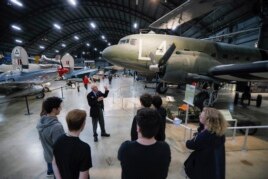25 May, 2019
The French and the Americans are working together again on a project marking a major event in World War II. This time, they are giving people the chance to travel back in time and experience the invasion of Normandy, France.
United States-led Allied forces invaded northern France on June 6, 1944. The Normandy landings led to the end of Germany's control of Western Europe.
Seventy-five years later, the event is being remembered at the National Museum of the U.S. Air Force in Ohio. Visitors now have the chance to virtually transport themselves back in time to D-Day.
To do this, they need an electronic tablet, called a HistoPad. Visitors make movements on the device to see current images of historic places with re-creations of them in the past. They can also press on images to see videos, pictures and maps from 1944.
The new way of learning about the Normandy landings is part of the museum's D-Day observances.

In this Friday, April 26, 2019 photo, visitors browse the D-Day displays at the The National Museum of the U.S. Air Force, in Dayton, Ohio.
Allied commanders called the invasion Operation Overlord. The U.S. military used the term D-Day to identify the start date for any important military operation.
On June 6, 1944, about 156,000 U.S., British and Canadian forces invaded five areas along 80 kilometers of France's western coast. The troops were supported by thousands of ships, landing vehicles and airplanes. They also had help from French resistance fighters.
The Air Force museum, near Dayton, Ohio, is the first group in the United States to use the tablets. The French company Histovery developed the technology. Company officials have announced plans to expand the use of HistoPads to other parts of the U.S.
The tablets are among new technology increasingly in use at many museums and historic areas. They offer virtual and augmented reality to help learning and understanding.
Bruno de Sa Moreira works for the French company. He noted that the Air Force museum D-Day exhibit was a natural place to start in the U.S. He told the Associated Press, "It's a very exciting adventure. We are basically telling our joint history, when the American soldiers fought for the liberty of France. We have a common past and a common duty to remember."
HistoPads were first demonstrated five years ago at a French castle built in the 1500s. More than a million visitors each year use the devices at 15 monuments and museums in France.
The Air Force museum has large collections of troop carriers, fighter planes, and even German airplanes and weapons used at the time.
In one area, visitors see a life-like model of a U.S. paratrooper ready for battle with weapons and explosives, a field radio and a backup parachute. When added together, the equipment weighs about 68 kilograms.
The HistoPad will show what a paratrooper might have seen on the dangerous airplane drop.
Museum supervisor Jeff Dufurd said that the tablet "makes it very real. It's a device that allows us to connect our visitors with that moment in time and in doing so, it makes the artifacts from that time and that place even more powerful."
Chuck Edmonson is the museum's marketing director. He gave a few visitors a demonstration of the HistoPad on a recent morning. One of them was 67-year-old Deane Sager of Louisville, Kentucky. He was surprised by how real the images seemed. "Oh, my, that's what you'd see," he said.
The Air Force museum has more D-Day events planned on June 6.
I'm Jonathan Evans.
Dan Sewell reported this story for the Associated Press. Jonathan Evans adapted his report for VOA Learning English. George Grow was the editor.
________________________________________________________________
Words in This Story
adventure – n. an exciting or remarkable experience
augmented – adj. made greater, larger, or more complete
castle – n. a massive or imposing house
virtual(ly) – adj. being on or simulated on a computer or computer network; of, relating to, or existing within a virtual reality